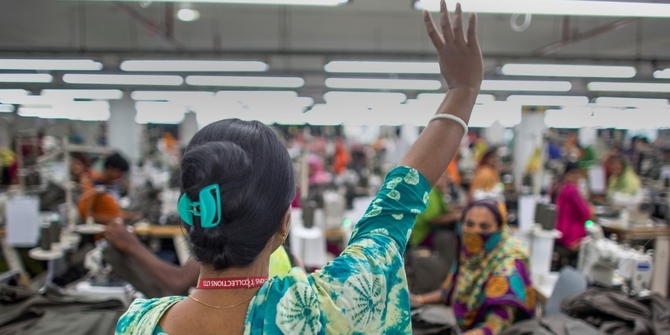
During a recent visit to London and the LSE South Asia Centre, Hameed Haroon, Chief Executive Officer of the Dawn Media Group, spoke to Sonali Campion, about freedom of the press and heritage in Pakistan.
SC: What is your view on Freedom of the Press in Pakistan today, and what do you find are the challenges that Dawn faces as a media group?
HH: I think we’d all agree that freedom of the press is a good thing, unfortunately it is very closely linked to freedom of expression, which in turn is linked to the kind of laws that permit or do not permit the expression of certain kinds of rights in societies such as Pakistan. There is therefore a very deep intrinsic linkage between freedom of press and expression, and even if the first becomes generally operative, there appears to be an unwritten form of censorship when religious views tend to predominate in the so-called ‘frontline ideology’ of the state. So it’s a question of tolerance, not only from government but from other individuals, for other political groups. Increasingly, more in India than in Pakistan, we’ve seen that the tolerance of corporations is also relevant. I think it is not possible to have freedom of expression in the press without a more general all-pervasive tolerance in a society.
To that extent in Pakistan today you can say the press is free, Dawn is far freer than most other newspapers because it sticks to its guns, and we don’t have a financial goal per se of survival. If the paper doesn’t work in terms of our existing values, then we’d have to give up the idea of it going forwards, because without independence press freedom is meaningless.
In the age of social media and a more diverse multimedia environment, would you say there is more of this censorship by the people as opposed to the top down state censorship?
Let’s not say state, let’s say dominant state institutions because certainly you would have to count the military and others in Pakistan. Yes there is enough intolerance from the religious parties, and one aspect of the backdoor connivance in this matter is when the institutions of government step back. The whole example of social media in Pakistan, which is clearly manipulated to a high degree by various state bodies, is an example of how the line is so thinly drawn. It’s not legality by the state which confers the right of censorship, in fact censorship has thrived predominantly under authoritarian regimes that have subsequently been declared unconstitutional.
But I think the important thing is intolerance is not the preserve exclusively of the government. There is a kind of social intolerance in South Asia which has overtaken countries like Pakistan, India, and Bangladesh in the last 50 years and today we seem to be receding backwards on an index of progressive rights. So I think we need to understand that unless we change our climate, unless we alter our basic values, unless we learn more about the basic principles of peaceful coexistence, I’d venture to say that however bad pre-partition societies were, they certainly knew more about coexistence than societies today. We need to re-learn our experiences and reposition ourselves in a more accommodating way, in particular with respect to the generation and toleration of ideas. If we don’t I feel we’ll work ourselves into a corner. I don’t know of any area of the world that progressed without intellectual progression.
Our Karachi conference earlier this year featured a panel on art and modernity, and one of the issues that came up was the lack of teaching on art theory and history. Do you think there’s a need to foster greater understanding of and research into Pakistan’s cultural heritage?
One of the problems is that we tend to get caught up in the wrong things. Modernity – which I would translate to modernism – is something which is part of tradition, to the extent that it is a spin off from tradition, it reacts to it. Contemporary art in India and Pakistan, for example, attempts to attack both modernism and tradition, and create a global style which is distinct. So I prefer modernism to what we are undergoing today. Only lately have Indians begun to appreciate the value of their modernists, Pakistan is still slow to do so.
We should stop looking at ourselves as potential marketing labels in the race for globalisation. We seem to be losing our identity in the deepest sense. Having watched India through the invasion of satellite television it’s pathetic to see how ideas that have been intellectually nurtured for generations have been abandoned without thought. In these ideas lay the seeds of the greatness of any nation in South Asia. We need to look carefully at our tradition, we see modernity not as a reform of tradition but a reaction to it with the opening of ideas, rather than a simple opening of ideas which allow our ideas to be overtaken. Ideas imported in from outside, which I don’t think will served the creative genius of our people in the true sense.
Linked to that, is there a sense that architectural heritage is being sacrificed for the sake of modernisation in cities like Karachi and Lahore?
It’s not just Karachi and Lahore, it’s also not a case of taking political postures of tradition. For example, let’s take the hill station, which didn’t exist as a concept until the British period. It was used by the goras for leisure, to escape the heat on the plains and air themselves. This is hardly what you would call tradition, but in fact it is part of our heritage and therefore becomes part of our tradition. Look at the degeneration of hill stations in India and Pakistan, there is a lack of independence in our special thinking, which manifests itself in our interpretation of public places, in our architecture with public adornment and so on. We are prepared to surrender to anything, which means, for example, the regulation of the corrupt and the greedy is not undertaken in the proper way, it leads to the demands of the rich to enrich themselves further. Unless we look at this matter carefully we have the problem that the post colonial rich, who were the successors to the colonial bourgeoise after independence and who have no sense of…I hate to use the word patriotism because it sounds negative. I think no sense of love for one’s own community, the love for others who coexist within the boundaries of South Asia. Unless we learn to respond positively to which is controlling the corruption of those classes which would seek to disenfranchise us of the kind of spiritual creativity and/of independence which comes with our tradition, there’s a very great danger that we will become degenerate urban slums who compete with each other within a political nationalist context to service the needs of the great powers like the US, the West, Russia, China, anybody. I think we need to think for ourselves. It’s very difficult to think for yourself when you’re too busy hating your own brother.
Finally, you did your undergrad at LSE, what’s it like being back?
Houghton Street is a little different, the news air of the BBC across the road seems to have been lost. The grotty bad restaurants and diners which filled this area, including the breakfast places, seem to have receded. There’s a kind of gentrification, the Clare Market Building and the Union Building are being knocked down, I’m told the Three Tuns Bar has changed place. The two porter’s lodges at the entrance to LSE on Houghton Street are no longer there. I haven’t been in the Old Theatre where I directed my first play, Ionesco’s The Bald Soprano/Bald Prima Donna. But I was here between 1971 and 74, that means going back about 50 years. It’s always dangerous to go back that far, particularly when you’re out of sync with the kind of trends of being young and techy. So I’m a little uncomfortable, a little sad, a little happy, and of course have learnt by perseverance to look with some optimism at the future.
This article gives the views of the authors, and not the position of the South Asia @ LSE blog, nor of the London School of Economics. Please read our comments policy before posting.
About the Authors
 Hameed Haroon is an LSE alumnus and Chief Executive Officer of the Dawn Media Group, Managing Trustee of the Mohatta Palace Museum, Karachi, and Managing Trustee of the Sind Endowment Fund Trust. He has previously served for multiple terms as President and General Secretary of the All Pakistan Newspaper Society, and is a member of the Sind Advisory Committee on Heritage.
Hameed Haroon is an LSE alumnus and Chief Executive Officer of the Dawn Media Group, Managing Trustee of the Mohatta Palace Museum, Karachi, and Managing Trustee of the Sind Endowment Fund Trust. He has previously served for multiple terms as President and General Secretary of the All Pakistan Newspaper Society, and is a member of the Sind Advisory Committee on Heritage.
 Sonali Campion is the former Communications and Events Officer at the South Asia Centre. She holds a BA (Hons) in History from the University of Oxford and an MSc in Comparative Politics from LSE. She tweets @sonalijcampion.
Sonali Campion is the former Communications and Events Officer at the South Asia Centre. She holds a BA (Hons) in History from the University of Oxford and an MSc in Comparative Politics from LSE. She tweets @sonalijcampion.
Cover Image: Karachi Municipal Corporation Head Office Building. Credit: Wikimedia Commons.







